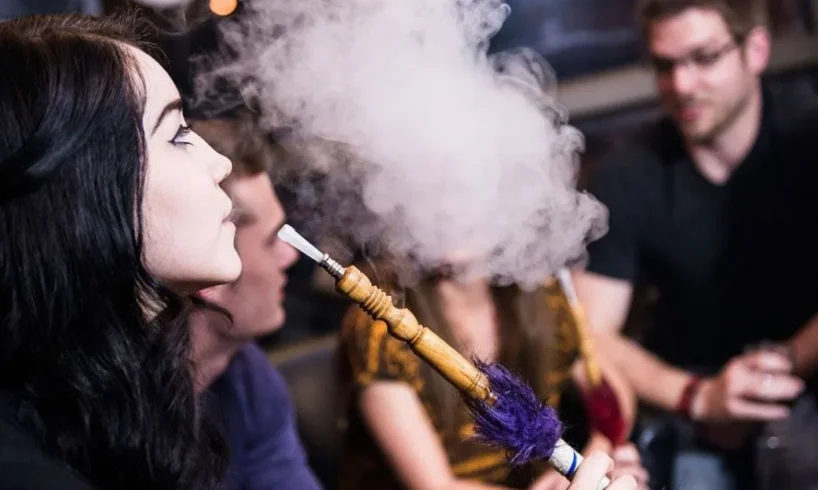
Shafaq News
The government employee drops into her café chair, ID badge
still clipped to her purse. A waiter lowers an ornate hookah, its glass base
catching the late-afternoon light. She draws in the fruit-scented smoke, the
coals crackling, and exhales a white cloud that drifts above the chatter around
her. Across the room, other women do the same.
Kirkuk no longer hides what it once condemned; women now
smoke openly, dismantling a taboo that ruled behavior for generations. What was
whispered about behind closed doors unfolds in daylight, unnoticed by a younger
generation quietly redefining normal.
The Habit That Got Freed
Samar Mohammed, 28, remembers the first spark. “Three years
ago, friends at a women’s gathering suggested trying hookah,” she told Shafaq
News. “We thought it would be once, maybe twice. But twice became habit.”
“We used to hide our smoking, afraid of what people would
say. Now it’s normal,” she continued. “Most of my colleagues try hookah after
work. Nobody thinks twice about it.”
In a few short years, whispers gave way to open laughter in
cafés where women now fill the seats once reserved for men. “Smoking has become
entertainment—a way to release tension after long hours,” said Huda Khalid,
another government employee. “Eight hours of bureaucracy—you just need to
breathe.”
The Numbers Behind the Shift
According to the 2024 Tobacco Atlas, about 19 percent of
Iraqi adults smoke, including 2 percent of women—roughly 200,000 people
nationwide. Ten years ago, women scarcely appeared in the data; today, the
sharpest rise is among urban, educated women in their twenties and thirties.
The World Health Organization places the annual cost of
tobacco at more than $1.5 billion in healthcare and lost productivity. Imports
reflect the same appetite: 700 shipments of tobacco entered Iraq from 28
countries in 2024.
Across Kirkuk, that demand has reshaped the city’s social
geography, where cafés with bright interiors, Wi-Fi, dessert menus, and
women-only corners now line Baghdad Road, giving leisure an air of legitimacy.
“Five years ago, not a single woman requested a hookah,” a
café owner who asked not to be named stressed. “Now a third of my customers are
women—employees, students, friend groups. They prefer fruit flavors. It’s not
shameful anymore. That’s the difference.”
Maha Abdul Karim, 45, explained that these evenings are less
defiance than reprieve. “We meet after work—four or five of us—and smoke
fruit-flavored hookah,” she said. “It’s just relaxation after a long day.”
Such cafés have become rare refuges in Iraqi life: spaces
where women can exist without purpose or permission—neither shopping nor
supervising, simply present.
Freedom or Its Imitation
For Raghad Hassan, 33, the act itself is an argument. “I’ve
smoked for three years—not because I’m addicted, but because I’m free,” she
said. “If men can sit in cafés and smoke for hours, why can’t I?”
Her language—freedom, choice, autonomy—echoes the national
conversation still unfolding two decades after the fall of Saddam Hussein’s
oppressive regime: who decides where women belong, and on what terms. In that
debate, a hookah pipe can feel less like leisure than declaration, a quiet
insistence on visibility.
Researcher Faris al-Bayati sees this new visibility as part
of a larger cultural current, particularly after 2003, when women discovered
new spaces for expression. “Cafés, social media, and global culture converged.
Smoking became one symbol of that shift—a mirror of what they saw from Beirut
to Istanbul.”
The same media that showcase women’s independence also
package it, however, turning smoke and neon into an aesthetic of empowerment.
Al-Bayati calls it “freedom designed for sale.”
The Price of Emancipation
At Kirkuk General Hospital, pulmonary specialist Dr. Saadoun
al-Azzawi watches the cost of that calm appear on X-rays. “Hookah smoke is five
to ten times heavier than cigarettes,” he explained. “People think water
filters toxins or that flavors make it safer. Both ideas are false.”
He estimates that one hookah session—about 45
minutes—matches the smoke volume of a hundred cigarettes, with a mix carrying
carbon monoxide, heavy metals, and carcinogens. He now treats women in their
twenties and thirties for chronic coughs, infections, and asthma-like symptoms.
Many, he said, are stunned to learn the connection.
His clinic’s charts show the pattern climbing year by year:
more young women with tobacco-related respiratory disease, more early signs of
lung damage. “The illusion of relaxation is costing them their
lungs.”
The World Health Organization attributes roughly 8 million
deaths each year to smoking—more than a million from secondhand exposure alone.
In Iraq, tobacco-linked heart disease, stroke, and cancer kill thousands
annually, yet cessation programs remain rare and poorly funded.
Law Without Force
Iraq’s 2012 Anti-Tobacco Law No. 19 forbids smoking in
public places in an attempt to curb such issues, but enforcement has long since
evaporated. A Kirkuk health-department official described the system as
“running on paper only.” Staff shortages, budget limits, and political
indifference have left regulations dormant, while municipal café licenses often
omit any clause on hookah service.
With no deterrent in place, cafés multiply, and many now
target female customers directly, introducing mild flavors and pastel branding
meant to soften hesitation and turn first-time curiosity into routine.
Progress or Paradox
To some Iraqis, the women filling cafés represent
long-denied autonomy; to others, a generation misled by commerce. For women
like Raghad Hassan, the smoke itself is proof of ownership—over time, space,
and choice. For doctors, it’s a public-health warning already ignored.
Between those views lies modern Iraq: still negotiating what
liberation costs and who decides its limits.
In a country once governed by rigid codes of visibility,
even the ordinary can feel revolutionary. A café table shared after work,
conversation unfiltered by family or fear—such gestures would have drawn
scandal not long ago. Now they pass without comment.
The revolution, perhaps, is that ordinariness–whether it
signals progress or peril depends on who is watching, but the sight of women
claiming public space once reserved for men captures Iraq’s quiet
transformation. It unfolds not in protests or policy, but in the steady rhythm
of exhaled smoke—each breath a small act of ownership.
Yet as Wasan al-Azzawi observed, “The freedom that damages
the body is still freedom—but it comes with a cost.”
Written and edited by Shafaq News staff.





